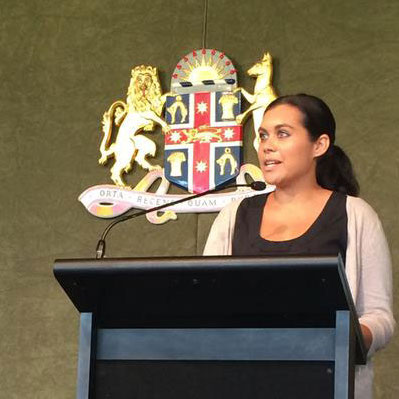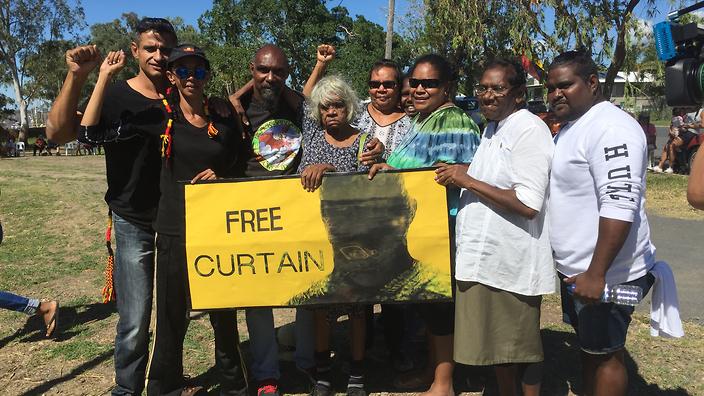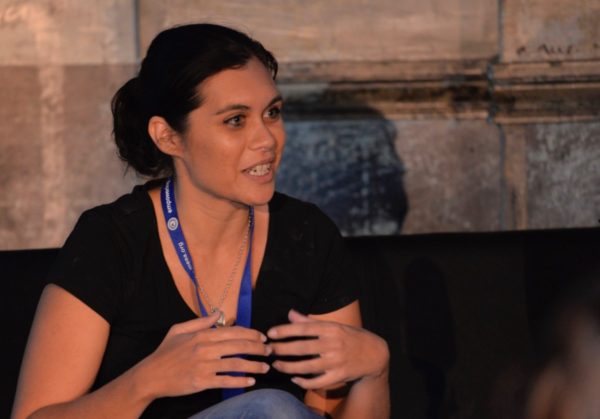Amy McQuire is a Darumbal and South Sea Islander journalist who’s currently working as Buzzfeed Australia‘s Indigenous Affairs reporter. Since October 2016, Amy has been working with Martin Hodgson on the investigative podcast Curtain – centred on the wrongful conviction of Aboriginal man Kevin Henry.
Speaking to the Australian Audio Guide, Amy talks about crafting images with sound, broadcasting as a path to criminal and social justice, and the frustration of trying to convince mainstream audiences to care.

What piece of audio has had the most profound effect on you – as a listener, as an audio maker or both?
There is a piece of music recorded in the sixties called ‘Morning Star’. It is a clan song relating to the morning star ceremonies of the Yolngu, and it was sung by senior Aboriginal men Djawa, Mudpo and Waliparu at Milingimbi mission in Arnhem Land. It is absolutely beautiful and haunting, but the reason it is so affecting to me is that, in 1977, astronomer Carl Sagan chose it to go on the Voyager Golden Record – one of which left the solar system (attached to Voyager 1) a few years ago. It is absolutely mind-blowing to think that one day, maybe after we are all gone, this ancient song will continue to live on … and that other life forms may one day hear it, and know of the phenomenal culture and ceremony of the Yolngu people.
It just makes me think that despite the horrific attempts by colonisers to wipe out culture and language, we have survived – and may travel further than we could ever imagine.
Where did the idea for Curtain come from?
I heard about the case of Kevin Henry, or ‘Curtain’, from a relative while I was living in Sydney and working at New Matilda.
Kevin Henry had protested his innocence for murder over the past two decades, and yet no one had looked into the case properly. It was as if he didn’t even exist. I asked around Rockhampton, and discovered everyone had heard rumours about Kevin’s innocence. There were many who were adamant that a grave injustice had been perpetrated against him – and yet few people outside the Aboriginal community knew about the case.
A year later, I was in Brisbane working for the Brisbane Indigenous Media Association, and I interviewed Yuin lawyer Martin Hodgson. Martin works on US death penalty cases, largely centred on wrongful conviction. He posed the question, ‘How many Indigenous prisoners in Australia are innocent?’, and I immediately thought of Kevin.
I asked Martin to look into his case, and within two weeks we had evidence that supported his innocence. We spent a couple of months researching, talking every night about the case, and we decided that to get the media attention it deserved, we would do a podcast.
What is your favourite part of making it?
This is the biggest story of my life – an Aboriginal man has been wrongfully convicted, and has served 26 years in jail for a crime he didn’t commit. Even now, he has been continually knocked back for parole because he refuses to admit guilt. It has been an incredible learning experience for me. The best part is feeling like we are actually working on a story that will achieve an outcome for Kevin. We are up to 36 episodes as of writing this [43, as this interview is published – Ed.], and we aren’t planning on stopping until Kevin walks free from prison. In that sense, we are a very different project from other ‘true crime’ podcasts. We aren’t focused on entertainment, we aren’t focused on winning awards; we are solely interested in getting justice not only for Kevin but the woman who lost her life, Lynda.
If Kevin Henry is released, he will be the longest-serving exonerated prisoner in Australia’s history… and yet we are finding it really hard to get people to care. Apathy is so dangerous for our people.
What is the hardest part of producing Curtain?
The hardest part is technology. When we started this podcast I was working at BIMA, and so had access to their equipment as well as their technical support, and they really went above and beyond to help us. Late last year, I left that job to return to Rockhampton, partly to work on the case from here. It meant we had to sacrifice a lot of the audio quality, and Martin has to do a lot more work because he edits and produces from his home in Bega, New South Wales.
The other hard part is just getting people interested. We are entirely Aboriginal-run and operated, and our podcast is broadcast on 4US, the Aboriginal community radio station in Rockhampton. If Kevin Henry is released, he will be the longest-serving exonerated prisoner in Australia’s history… and yet we are finding it really hard to get people to care. Apathy is so dangerous for our people.

What’s the best thing about working with sound?
In our early episodes, I spent a lot of time scripting and editing, but unfortunately now due to our weekly schedule, we don’t have the time to do that. But I really love when you can make a piece of audio feel like you are actually there. I really love the sounds of country and water, and the images you can make just from sound. If we had greater resources, it would have been great to continue that.
The other thing is that we can communicate to a wider audience, particularly to Kevin himself. Because our podcast is broadcast on 4US, inmates at the Capricornia Correctional Centre – including Curtain – can listen in every week and hear updates. It’s incredibly exciting, and more powerful than writing thousands of words that many mob inside wouldn’t be able to access.
What’s the best (or worst) advice you’ve received about podcasting?
I haven’t really received any advice – Martin and I have largely been working on this project by ourselves. I think the people who listen to us are really listening to hear about the case, rather than to be entertained. We receive questions from people about the legal process, and about certain details of the case that they feel have not been fully fleshed out. At the beginning, I researched a lot about storytelling in radio form. I looked a lot at This American Life and Serial as examples, but in the end, we decided to make our own format. I’m sure there would be a lot of far more experienced producers who could offer some good advice, and I’m always open to that!
I really love the sounds of country and water, and the images you can make just from sound. If we had greater resources, it would have been great to continue that.
What has been your biggest lesson as a producer so far?
I don’t really see myself as a producer – I still see myself as a journalist. But I’ve learnt a lot from this case, particularly around the right questions to ask of our ‘justice’ system. It is an incredibly complex topic that I have reported on for a long time, and yet there are still areas that I need to spend a lot of time researching.
Martin has been a great help to me in explaining some of the complexities around parole, for example. We have also had to deal with issues around uncovering vital information that we know would be good for the podcast, but which we can’t publish right away due to legal reasons. It’s been a constant lesson in how to negotiate that while ensuring our audience remains properly informed.

Do you interact with your audience, or receive feedback or criticism about your work?
Yes – we definitely try to. We have done a few episodes focused on answering questions from listeners. We don’t get a great deal of feedback, though, which is disappointing.
If you could go out to dinner with any audio maker, who would it be – and what would you talk about?
I’m not too sure! I don’t think he counts as an audio maker, but I would love to have dinner with Neil Degrasse Tyson – Startalk is another one of my obsessions. And of course, I would ask him about the universe, and make sure he answers every question, regardless of how silly!
What are you listening to at the moment?
The podcast I listen to religiously is The Infinite Monkey Cage, co-hosted by Brian Cox and Robin Ince. It’s hilarious and also really clever. It really sparked my interest in science. It’s very clever how they tie in really complicated scientific topics with humour, and I also really like when they ask the big questions. It’s just really entertaining, and I find I can listen back to certain episodes a number of times.
What’s your favourite Australian podcast, and why?
I like Tom Ballard’s podcast Like I’m a Six-Year-Old, and also I try and catch up on Daniel Browning’s Awaye!, but I often do that on the web, rather than by downloading podcasts. I also try and keep up with Larissa Behrendt’s Speaking Out programme, and will catch up with Chelsea Bond’s Let’s Talk from 98.9FM.
I find Ballard’s podcasts funny, and I’ll usually listen if I like the guest and want to hear more about what they have to say. And I keep up with Browning, Behrendt and Bond because I love Aboriginal media, and they always pose very interesting questions. Chelsea Bond’s ‘Wild Black Women’ on Wednesdays is hilarious – it’s her and her friend talking about what makes them wild that week, and it just works.
Broadcasting, particularly community radio, is one of the biggest areas of Aboriginal media. It is a form of self-determination in action.
What do you think is unique about Australian audio?
I’m not sure what’s unique about Australian audio, but I am a big supporter of Aboriginal audio.
Broadcasting, particularly community radio, is one of the biggest areas of Aboriginal media. It is a form of self-determination in action. It not only lets our people tell the stories that are underrepresented in the mainstream from our own perspective – it acts as an employer and hub for our communities. I know so many mob who have gotten their start in Aboriginal community radio, and without it we would be all the poorer.
What’s next for you as a producer?
Our big focus is on getting Curtain out of jail – he has spent 26 years inside for a crime he didn’t commit. But when we achieve that – and we will achieve it – we will hopefully be using the Curtain podcast to look into other cases, and continue interrogating how the justice system treats Aboriginal victims.